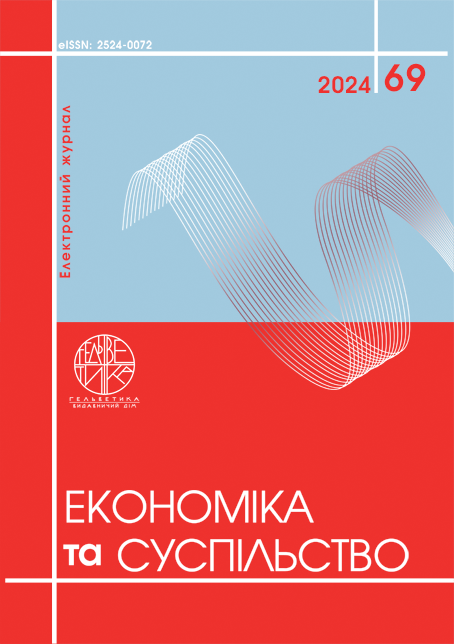ЦИФРОВІ РІШЕННЯ В СИСТЕМІ РЕВЕНЮ МЕНЕДЖМЕНТУ
Анотація
Ця стаття розглядає цифрові рішення в системі ревеню менеджменту, які забезпечують гнучкість стратегічної поведінки суб’єкта готельного бізнесу на ринку готельних послуг, спрямовуючи її на максимізацію доходів через оптимізацію операційної діяльності, оцінку ринкової кон’юнктури та моделювання стратегій управління попитом та поведінкою споживачів. Обґрунтовано напрями впровадження цифрових технологій в системі ревеню менеджменту: власні інформаційні системи (RMC), інтегровані цифрові платформи (R2B) та глобальні мережі в режимі обробки аналітики в реальному часі (CRM ERP). Для підвищення рівня цифровізації системи ревеню менеджменту суб’єктів готельного бізнесу розроблено модель алгоритмізації ухвалення рішень в системі ревеню менеджменту, яка дозволить структурувати етапи прийняття управлінських рішень, автоматизувати бізнес-процеси та їх результати в системі управління доходами. Результати дослідження також показують, що цифрові рішення ревеню менеджменту обґрунтовують використання аналізу даних Big Data та інструментів аналітики для обґрунтування рішень, аналізу поведінки споживачів та адаптації стратегій ціноутворення, сегментування споживачів та персоналізації пропозицій, впровадження спеціалізованого програмного забезпечення (RMS-системи) для автоматизації рутинних операцій (моніторинг ринку, аналіз цін конкурентів, оновлення пропозиції та тарифів), інтегрування внутрішніх інформаційних систем з глобальними цифровими платформами, мобільними додатками, CRM-системами, покращення комунікацій з клієнтами. В умовах зростаючої конкуренції цифровізація процесу управління доходами має важливе значення для стратегічного розвитку бізнесу.
Посилання
Mazaraki A., Boik M., Bosovska M., Kulyk M. Revenue management data digital transformation. In 2022 IEEE 4th International Conference on Modern Electrical and Energy System (MEES) (pp. 1-5). IEEE. 2022
Martínez-Vázquez J., Sanz-Arceg, E., Martín J. Tax revenue management and reform in the digital era in developing and developed countries. In Research Handbook on Public Financial Management (pp. 202-225). Edward Elgar Publishing. 2023
Wang X. L., Yoonjoung Heo C., Schwartz Z., Legohérel P., Specklin F. Revenue management: Progress, challenges, and research prospects. Journal of Travel & Tourism Marketing, 32(7), 2015. Р.797-811.
Alrawadieh Z., Cetin G. Digital transformation and revenue management: Evidence from the hotel industry. Tourism Economics, 2021. 27(2), 2021. Р. 328-345.
Katsoni V., Poulaki I. Digital evolution and emerging revenue management practices: evidence from Aegean airlines distribution channels. Journal of Hospitality and Tourism Technology, 12(2), 2021. Р. 254-270.
Imtiaz W. Revenue Management in the Digital Age: Innovations and Trends. Journal of Internet Banking and Commerce, 28(4), 2023., Р.1-3.
Moll J., Yigitbasioglu O. The transformation of revenue management practices during the digital era: Insights from SMEs. In Accounting and Finance Association of Australia and New Zealand (AFAANZ) Annual Conference. 2024.
Sprenger M., Mettler T., Winter R. A viability theory for digital businesses: Exploring the evolutionary changes of revenue mechanisms to support managerial decisions. Information Systems Frontiers, 2017. Р. 899-922.
Viglia G., De Canio F., Stoppani A., Invernizzi A. C., Cerutti,S. Adopting revenue management strategies and data sharing to cope with crises. Journal of Business Research, 2021. Р. 336-344.
Li, W. Digital Business and Revenue Models. In Strategic Management Accounting in a Network Economy Singapore: Springer Nature Singapore. 2023. Р. 211-235.
Liu A., Li J., Xie K. L. Understanding the impact of dynamic pricing on hotel revenue. Tourism Management, 2017. Р. 281-291. URL://doi.org/10.1016/j.tourman.2016.08.007 (дата звернення: 01.11.2024)
Mazaraki, A., Boiko, M., Bosovska, M., & Kulyk, M. (2022). Revenue management data digital transformation. In 2022 IEEE 4th International Conference on Modern Electrical and Energy System (MEES) (pp. 1-5). IEEE.
Martínez-Vázquez, J., Sanz-Arcega, E., & Martín, J. M. T. (2023). Tax revenue management and reform in the digital era in developing and developed countries. In Research Handbook on Public Financial Management (pp. 202-225). Edward Elgar Publishing.
Wang, X. L., Yoonjoung Heo, C., Schwartz, Z., Legohérel, P., & Specklin, F. (2015). Revenue management: Progress, challenges, and research prospects. Journal of Travel & Tourism Marketing, 32(7), 797-811.
Alrawadieh, Z., Cetin, G. (2021). Digital transformation and revenue management: Evidence from the hotel industry. Tourism Economics, 2021. 27(2), Р. 328-345.
Katsoni, V., & Poulaki, I. (2021). Digital evolution and emerging revenue management practices: evidence from Aegean airlines distribution channels. Journal of Hospitality and Tourism Technology, 12(2), 254-270.
Imtiaz, W. (2023). Revenue Management in the Digital Age: Innovations and Trends. Journal of Internet Banking and Commerce, 28(4), 1-3.
Moll, J., & Yigitbasioglu, O. (2024). The transformation of revenue management practices during the digital era: Insights from SMEs. In Accounting and Finance Association of Australia and New Zealand (AFAANZ) Annual Conference.
Sprenger, M., Mettler, T., & Winter, R. (2017). A viability theory for digital businesses: Exploring the evolutionary changes of revenue mechanisms to support managerial decisions. Information Systems Frontiers, 19, 899-922.
Viglia, G., De Canio, F., Stoppani, A., Invernizzi, A. C., & Cerutti, S. (2021). Adopting revenue management strategies and data sharing to cope with crises. Journal of Business Research, 137, 336-344.
Li, W. (2023). Digital Business and Revenue Models. In Strategic Management Accounting in a Network Economy (pp. 211-235). Singapore: Springer Nature Singapore.
Liu, A., Li, J., & Xie, K. L. (2017). Understanding the impact of dynamic pricing on hotel revenue. Tourism Management, 59, 281-291. DOI: https://doi.org/10.1016/j.tourman.2016.08.007 (accessed November 01, 2024)

Ця робота ліцензується відповідно до Creative Commons Attribution 4.0 International License.


